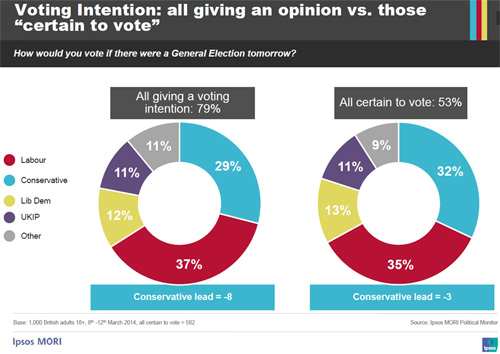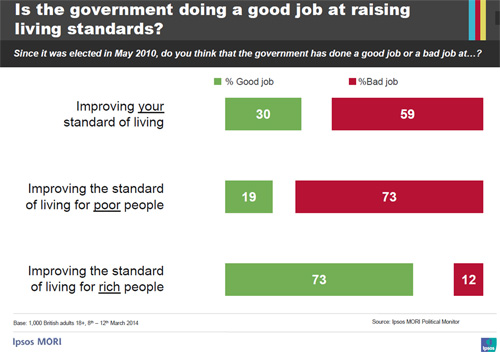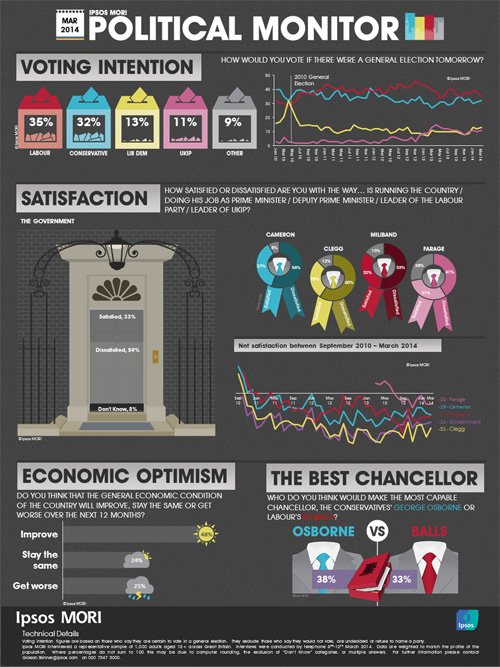Ipsos Political Monitor March 2014
Majority of Britons believe the government has done a good job for the rich, but a bad job for their own standard of living
CON 32 (+1); LAB 35 (-3); LIB DEM 13 (+1); UKIP 11 (+1)
This month’s Ipsos Political Monitor shows the Conservatives continuing to lead Labour on managing the economy, although they are neck-and-neck with regard to taxation policy and Labour lead on unemployment policy. One in three (35%) think the Conservatives have the best policies on managing the economy, compared with 22% for Labour; Labour lead the Conservatives on unemployment by 32% to 27%, and the two are almost level on taxation with Labour supported by 27% and the Conservatives on 25%.

The public still think George Osborne would make a more capable Chancellor than Ed Balls, although the gap between them has narrowed since we last asked this question in December 2013. Mr Osborne now has a five percentage point lead over Mr Balls, backed by 38% to Mr Balls’ 33%. This is down from an eleven point advantage for Mr Osborne in December.
Britons are split as to whether the government has done a good job on managing the economy, however – despite the Conservative lead in this area. Just under half each say the government has done a good job (47%) and a bad job (46%) at managing the economy. The public are similarly split regarding the government’s performance on keeping unemployment down (44% think it has done a bad good job, 48% a bad job). More than half (56%) think the government has done a bad job on handling taxation and public expenditure, however, with 35% saying they’ve done a good job.
However, this does represent a significant improvement for the government’s ratings since October 2011. The proportion thinking they have done a good job managing the economy has increased from 36% to 47%, and those thinking they have done a good job keeping unemployment down have increased from 15% to 44% (ratings on taxation and public expenditure have only increased slightly from 32% to 35%). All, though, are still below the heights Labour achieved when it was in power.
Credit for economic growth in the UK is split between factors outside of party politics and the coalition government and its component parties. The state of the global economy is seen as deserving the most credit, with 37% citing this factor, while a quarter (25%) think the Bank of England deserves most credit. The coalition government overall is credited by 20%, with the Conservatives on 15%. Just four percent of the public credit the Liberal Democrats for economic recovery, behind both the European Union and the previous Labour government (both on seven percent). When those crediting the coalition government overall, the Conservatives and the Liberal Democrats are combined, they come to 37% (it should be noted that respondents could select up to two answers in any combination for this question).
The Liberal Democrats do gain the credit for raising income tax allowances to £10,000 from this April, however. Despite recent debates about the matter, 45% credit the Liberal Democrats – although a third (33%) say the Conservatives deserve most credit.
There is a perception that the government has done a better job for the rich than the poor regarding standard of living since they came to power in 2010. Three quarters (73%) believe they have done a good job at improving the standard of living for rich people, with an identical proportion (73%) believing they have done a bad job at improving the standard of living of poor people. Perceptions are similar across each social class for both measures, although perceptions differ along party lines; Conservative supporters are more likely to think the government has done a good job for poor people’s standard of living (they are evenly split – 44% think they have done a good job, 42% a bad job), and are less likely to think the government has done a good job for rich people (63% of Conservative supporters compared with 73% overall).

Regarding their own standard of living, six in ten (59%) believe the government has done a bad job since it was elected, with 30% saying they have done a good job. People in social classes AB, C1 and C2 are all equally critical, and those in social class DE even more so, with only a quarter (24%) feeling the government has done a good job improving their standard of living.
People’s voting intentions are little changed from last month, with the exception of Labour who are down three percentage points to 35%. The Conservatives (32%), Liberal Democrats (13%) and UKIP (11%) are all up one percentage point each.
Satisfaction ratings for the main party leaders and government are as follows:
- Satisfaction with Nick Clegg has risen slightly, with 29% now satisfied with his performance as Deputy Prime Minister and 60% dissatisfied. His net rating (% satisfied minus % dissatisfied) is now -31, up from -39 in February.
- David Cameron ratings have remained steady among the public at large, with 37% satisfied and 56% dissatisfied, giving him a net rating of -19. Among Conservative supporters, his satisfaction levels are the highest since March 2012; 81% are satisfied with his performance as Prime Minister, with 18% dissatisfied. Giving him a net rating of +63 among Conservatives.
- Ed Miliband’s ratings are in line with last month with a net rating of -21: 32% are satisfied with his performance as Labour leader, while 53% are dissatisfied. Half (51%) of Labour supporters are satisfied with his performance, while 37% are dissatisfied, giving him a net rating of +14 among Labour supporters.
- Nigel Farage’s net rating is at -10. 31% are satisfied in his performance as UKIP leader and 41% are dissatisfied, while three in ten (28%) still say they “don’t know”.
- Net satisfaction in the performance of the government is at -26, with 33% satisfied and 59% dissatisfied.
Economic optimism remains high. Nearly half (48%) think the general economic condition of the country will improve over the next 12 months, while 25% think it will get worse, and 24% stay the same. This gives an Ipsos Economic Optimism Index (% get better minus % get worse) of +23.

Gideon Skinner, Head of Political Research at Ipsos said:
“The Conservatives still hold the lead on the economy, as economic conditions improve, which may help explain why they are not losing many votes to Labour (who have been picking up more from the Liberal Democrats). But people do not think the government has improved their own personal standard of living, which may be partly why the Conservatives aren't increasing their vote share either.”
Notes to Editors:
Ipsos interviewed a representative sample of 1,000 adults aged 18+ across Great Britain. Interviews were conducted by telephone 8th-12th March 2014. Data are weighted to match the profile of the population.



